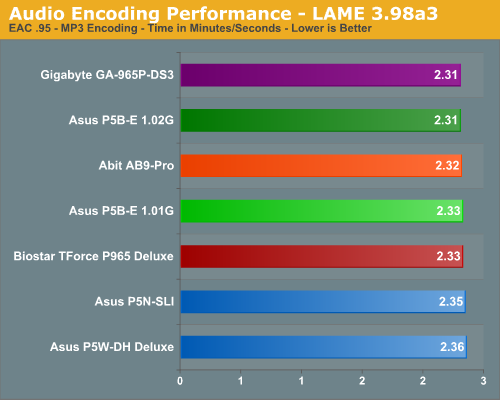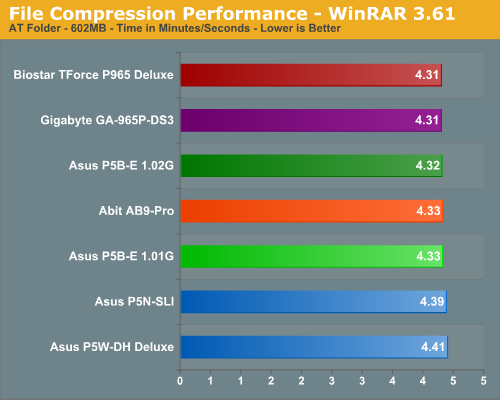Intel P965: Mid-Range Performance Sector Roundup
by Gary Key on October 20, 2006 9:00 PM EST- Posted in
- Motherboards
Media Encoding Performance
Our first test is quite easy - we take our original Office Space DVD and use AnyDVD Ripper to copy the full DVD to the hard drive without compression, thus providing an almost exact duplicate of the DVD. We then fired up Nero Recode 2, selected our Office Space copy on the hard drive, and performed a shrink operation to allow the entire movie along with extras to fit on a single 4.5GB DVD disc. We left all options on their defaults except we checked off the advanced analysis option. The scores reported include the full encoding process and are represented in minutes and seconds, with lower numbers providing better performance.

The results were interesting as the P965 boards scored better than the 975X board. We have seen this in previous testing with this benchmark and it appears the improved memory controller on the P965 is making a difference. The Gigabyte and ASUS 1.02G board score first with the other boards slightly behind. The ASUS 1.01G board consistently scored behind the 1.02G board in each of the test results due to the relaxed memory timings. If we set the memory timings on the 1.02G board to the 1.01G settings we produced the same test results.
Audio Encoding Performance
While the media encoding prowess of the P965 boards were superb in our initial media encoding testing, we wanted to see how they faired on the audio side. Our audio test suite consists of Exact Audio Copy v095.b4 and LAME 3.98a3. We utilize the INXS Greatest Hits CD that contains 16 tracks totaling 606MB of one time '80s hits.
We set up EAC for variable bit rate encoding, burst mode for extraction, use external program for compression, and to start the external compressor upon extraction (EAC will read the next track while LAME is working on the previous track, thus removing a potential bottleneck with the optical drive). We also set the number of active threads to two to ensure both cores are active during testing. The results are presented in minutes/seconds for the encoding process, with lower numbers being better.

As in the media encoding section, the more intensive CPU and storage system tests seem to favor the P965 over the i975X when running at the same memory timings. We basically see the same results again with the Gigabyte and ASUS 1.02G board taking top honors with the other P965 boards close on their heels. Once again the reworked/enhanced memory controller on the P965 offers better performance than the 975X and 570SLI although you need a benchmark to tell the differences. Our ASUS 1.02G and 1.01G boards scored identically when utilizing the same memory timings in our offline tests.
File Compression Performance
In order to save space on our hard drives and ensure we had another CPU crunching utility, we will be reporting our file compression results with the latest version of WinRAR that fully supports multi-treaded operations and should be of particular interest for those users with dual core or multi-processor systems. Our series of file compression tests utilizes WinRAR 3.61 to compress our test folder that contains 444 files, ten subfolders, and 602MB worth of data. All default settings are utilized in WinRAR along with our hard drive being defragmented before each test.

The results speak for themselves with the Intel P965 once again leading in our CPU intensive compression test. The Gigabyte and Biostar boards share first place honors with the Abit and ASUS boards finishing right behind them. The margins are once again extremely close between our P965 boards just reiterating the fact that boards based on the same chipset are going to offer the same performance. The 975X and 570SLI boards trail slightly and these results mirror the same scores we saw in our preview of the P965 chipset a couple of months ago.
Our first test is quite easy - we take our original Office Space DVD and use AnyDVD Ripper to copy the full DVD to the hard drive without compression, thus providing an almost exact duplicate of the DVD. We then fired up Nero Recode 2, selected our Office Space copy on the hard drive, and performed a shrink operation to allow the entire movie along with extras to fit on a single 4.5GB DVD disc. We left all options on their defaults except we checked off the advanced analysis option. The scores reported include the full encoding process and are represented in minutes and seconds, with lower numbers providing better performance.

The results were interesting as the P965 boards scored better than the 975X board. We have seen this in previous testing with this benchmark and it appears the improved memory controller on the P965 is making a difference. The Gigabyte and ASUS 1.02G board score first with the other boards slightly behind. The ASUS 1.01G board consistently scored behind the 1.02G board in each of the test results due to the relaxed memory timings. If we set the memory timings on the 1.02G board to the 1.01G settings we produced the same test results.
Audio Encoding Performance
While the media encoding prowess of the P965 boards were superb in our initial media encoding testing, we wanted to see how they faired on the audio side. Our audio test suite consists of Exact Audio Copy v095.b4 and LAME 3.98a3. We utilize the INXS Greatest Hits CD that contains 16 tracks totaling 606MB of one time '80s hits.
We set up EAC for variable bit rate encoding, burst mode for extraction, use external program for compression, and to start the external compressor upon extraction (EAC will read the next track while LAME is working on the previous track, thus removing a potential bottleneck with the optical drive). We also set the number of active threads to two to ensure both cores are active during testing. The results are presented in minutes/seconds for the encoding process, with lower numbers being better.

As in the media encoding section, the more intensive CPU and storage system tests seem to favor the P965 over the i975X when running at the same memory timings. We basically see the same results again with the Gigabyte and ASUS 1.02G board taking top honors with the other P965 boards close on their heels. Once again the reworked/enhanced memory controller on the P965 offers better performance than the 975X and 570SLI although you need a benchmark to tell the differences. Our ASUS 1.02G and 1.01G boards scored identically when utilizing the same memory timings in our offline tests.
File Compression Performance
In order to save space on our hard drives and ensure we had another CPU crunching utility, we will be reporting our file compression results with the latest version of WinRAR that fully supports multi-treaded operations and should be of particular interest for those users with dual core or multi-processor systems. Our series of file compression tests utilizes WinRAR 3.61 to compress our test folder that contains 444 files, ten subfolders, and 602MB worth of data. All default settings are utilized in WinRAR along with our hard drive being defragmented before each test.

The results speak for themselves with the Intel P965 once again leading in our CPU intensive compression test. The Gigabyte and Biostar boards share first place honors with the Abit and ASUS boards finishing right behind them. The margins are once again extremely close between our P965 boards just reiterating the fact that boards based on the same chipset are going to offer the same performance. The 975X and 570SLI boards trail slightly and these results mirror the same scores we saw in our preview of the P965 chipset a couple of months ago.










62 Comments
View All Comments
JarredWalton - Friday, October 20, 2006 - link
I think that was a temporary glitch where the article went live before the last page's text was updated. Shame on you for skipping straight to the end.... ;)BadThad - Sunday, October 22, 2006 - link
Is the v1.02G Asus P5B-E using all solid capacitors? I read a press release stating that Asus was releasing the "P4B-E Plus" version with all solid caps. Rumor says the "Plus" version will not be sold in the USA.....arrgggggg. Tell me that's not true. I want the solid caps for long-term reliability. I'm wondering if our "Plus" is actually the v1.02G?